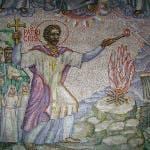
While the Mass (Divine Liturgy) has a central role in the Christian life, we must remember, Christians throughout the centuries, and in many diverse places, have remained faithful while incapable of routine participation in the Mass (and other sacraments). Many Christians have had infrequent connection with priests, for one reason (priest shortage) or another (plague), that they had make do with a Christian life that had infrequent reception of the sacraments. This, certainly, is a concern, and the church desires to make the sacraments as accessible as possible (which is why the Amazon Synod was concerned about the shortage of priests and the needs of the faithful in the Amazon region).
While historically many Christians who lived outside of cities, in the various towns and villages which did not have a priest of their own, sometimes received the sacraments only once a year, many of us have grown accustomed to the way modern Western society allows us to much more easily travel to receive the sacraments on a frequent basis. Until recently, we have had a spirituality which could center on the Mass in a way many other Christians could not. This, in some ways, has made us rely too much on the ease of access that our spirituality has suffered. We were never expected to reduce our spirituality in such a fashion.
Now, many of us, at least for the present time, face a similar situation to many of our fellow brothers and sisters in the Amazon and other parts of the world. Thanks to the spread of the coronavirus, we find ourselves experiencing what other Christians have experienced perhaps all their lives. We might not have a priest shortage (yet), but we are finding ourselves quarantined, with little to no access to priests and the sacraments which priests can offer. Just like those who in other times and places found ways to continue their walk with God, we can, and should, continue on in our faith. We should make time to pray every day. On Sundays, might watch one of the many streaming or televised Masses, or at least, find the Scripture readings for the week, read them, and take time to contemplate their meaning for our lives.
Likewise, there are many devotions which we can use to help us as we deal with the sorrows and fears which we might have as a result of the pandemic. We might make a list of some of our own favorite prayers, and pray them when we wake up or before we go to sleep, such as the Our Father, the Hail Mary, the Kyrie Eleison, the Trisagion Prayer, and the Heavenly King. The rosary, certainly, can be picked up and used daily. Similarly, praying from the Psalms can help us find consolation. The Liturgy of the Hours (said alone or with those in one’s household) offers us a way to shape our day and put our hope in God. Various other daily prayers, such as the Synekdemos, also can lift our spirits as we put our hope, faith, and love in God.
We can do some spiritual reading every day. It doesn’t have to be from Scripture. It doesn’t have to be from writings of the saints. Though, of course, both of those are excellent resources, what we need are things which inspire us and help lead us to God. Theological writings inspire me, but so does many good works of fiction. For others, they my want to take on the reading of poetry. What is important is to find something to help motivate us, to get us thinking and inspired, so that we do not end up either in sloth or in despair.
How we treat others during this time, also, is very important. If we are living with others (friends or family), we might find staying indoors for a long-term basis rather difficult. We must do our best to be charitable to each other, looking after each other’s needs, even as we need to find a way to have time for ourselves. But we must also concern ourselves with the well-being of our community as a whole. We must recognize that our duty to the community means we should respect a quarantine or travel restrictions when they are put in place, but also, when we need to go out, such as to a store, we must think of others and their needs. We must not excessively hoard essential goods, nor should we try to find a way to make a profit on the extreme needs of others. We need to work together, showing our love to one another; this is how we are to live out our lives as Christians, being more concerned about the welfare of others than we are about our own selfish desires. Certainly, we can and should do what we can to properly take care of our own needs – but we can and should do so with as much charity to others.
Nonetheless, many fear that with the lack of contact with priests, they might not be able to have their spiritual needs met, especially if someone they love not only becomes infected by the coronavirus, but dies from it. If they cannot get communion, if they cannot get confession, if they cannot get last rites, they fear that they will be unable to have their sins forgiven and will find themselves going straight to hell. While this fear is understandable, we must keep in mind God love us all, Jesus came to the world to save us and not condemn us, and God is not going to expect the impossible from us.
While it is important to take the need of the sacraments seriously, and to receive them when we are able, the Christian faith teaches us that God’s merciful grace is not bound by the church’s sacraments. Those who are unable to receive the sacraments due to no fault of their own have ways to receive the sacramental graces which they need for their salvation. It is this grace, the thing of the sacrament itself, and not the ritual, which is necessary. The sacramental ritual is normative, but God, in his love for humanity, takes into consideration our intents and desires, so that if we cannot receive a particular sacrament, the desire itself can bring about the sacramental grace in a time of need (such as when we are dying). This is why the church teaches those who die without receiving the sacramental form of baptism can receive the grace of baptism itself and find salvation. Similarly, those who are unable to receive communion can receive spiritual communion. Finally, those who are unable to have a priest hear their confession before they die, can intend such confession, ask God for forgiveness for their sins, and receive God’s saving grace: they do not need to fear God will not forgive them.
If we are in need of a sacramental confession and are able to get one, we should follow through with it, but if we cannot, God does not abandon us and leave us without hope, as Peter Lombard, in his Sentences indicates:
What, then, is to be felt concerning this? What is to be held? Surely, that sins are blotted out by contrition and humility of heart, even without confession by the mouth and payment of outward punishment. For from the moment when one proposes, with compunction of mind, that one will confess, God remits because there is present confession of the heart, although not of the mouth, by which the soul is cleansed inwardly from the spot and contagion of the sin committed, and the debt of eternal death is released.[1]
Of course, if the person does not follow through with such a confession, when it is possible, then it is possible to question their contrition, for those who are contrite will follow through with the normative rite of confession if possible. For, Peter Lombard explains, inward metanoia will lead us to do what we can to make satisfaction for our sins, of which sacramental confession is normative: “For just as inward penance is enjoined upon us, so also outward satisfaction and confession by mouth, if they are possible; and so he is not truly penitent, who does not have the intention to confess.” [2] And so, if there is opportunity to confess (one which we can realistically make), it does not suffice to keep a private confession to God. [3] Likewise, to make sure our intention is pure, Peter Lombard suggests that if we cannot confess to a priest, we might want to make our confession to someone else, like a friend, not because our friend will be able to absolve us of our sins, but because such humility in spirit keeps us contrite. [4] What Lombard found especially important was to emphasize the hope we have for forgiveness, so that no matter where we are at, when we are dying, we still have hope of salvation. We can repent at the very end of our lives, with or without a priest, and if the contrition is true, God’s saving grace can forgive us our sins:
It must always be known that the time of repentance lasts until the last moment of life. – POPE LEO. Hence, Pope Leo: “No one is to be despaired of, for so along as he remains in this body, because sometimes what the diffidence of youth delays, is accomplished by a more mature counsel.” [5]
This is not to suggest people should put off sacramental penance if they are in need of it and can receive it. The longer people put it off, the harder it will be for them to be contrite. The habit of sin might get in the way of contrition at the point of death. This is not to say it will, but rather, to serve as a warning that we must not forgo the sacraments when there is no good reason to do so.[6]
Peter Lombard’s Sentences represents one of the fundamental works of systematic theology from the Catholic tradition; his exploration of the sacraments became normative, especially since his work was the textbook used in medieval theology. St. Thomas Aquinas, St. Bonaventure, and many others wrote commentaries on the Sentences as a part of their own education. And so, it should not be surprising that St. Thomas Aquinas, following the spirit of Lombard, indicates that grace can be and is received by those who truly intend to receive the sacraments:
Nonetheless, there is this consideration. Baptism has some effectiveness for the remission of sins even before it is actually received, while one has the purpose of receiving it. We grant that afterwards – when it is actually received – it bestows a fuller effect both in the achievement of grace and in the remission of fault. Sometimes, too, grace is bestowed in the very reception of baptism and a fault is remitted for which previously there was no remission. And thus the keys of the Church have effectiveness in one before he actually submits himself to them, provide that he has the purpose of submitting himself to them: nevertheless, he achieves fuller grace and forgiveness when he actually submits himself to the keys by confession and receiving absolution; and nothing prevents our thinking that sometimes a grace is conferred by the power of the keys one who has confessed, in the course of absolution itself, and that by this grace his fault is dismissed. [7]
St. Thomas points out that it is possible to receive grace due to the intention to the sacraments. Baptism of desire is a key representation of this fact. However, he also reminds us that greater grace is given when we receive the sacramental form of that grace. This should help us to understand how and why people can receive forgiveness through contrition while recognizing sacramental confession is not only normative, but offers superior graces to those who receive it. When dealing with sins, we have to deal with the guilt of the sin, but also the need to repair the harm which the sin has done (and others). That is, we need to make satisfaction for our sins. We can receive forgiveness but still need to make satisfaction (and if we do not make full satisfaction for our sins before we die, God’s mercy allows us to do so after death, as the teaching of purgatory indicates). Sacramental confession not only offers the forgiveness of sins, but greater graces in relation to the satisfaction which we must make. But if, through no fault of our own, we cannot have such a confession before we die, we can still find forgiveness and have hope for our salvation.
What all of this means is that we should not panic and be afraid if we are unable to receive the sacraments due to the coronavirus (or, for any other similar reason). Christian wisdom tells us that God loves us. He is not an unmerciful tyrant who will cast us away because of circumstances out of our control. Due to the fact that many Christians did not have easy access to the sacraments, the church realized this early on within its history. God has his ways to offer his grace if we are open to them. We need not fear for our salvation.
It is important to remain open to God. When we cannot go to Mass, when we cannot receive the sacraments as normal, we should find ways in which we continue our spiritual life. It is important to put our hope and faith in God, even as it is important for us to act in prudence. Reading of Scripture, saying daily prayers, doing acts of charity (even if it is for those who are in our household) are good ways to do this. We must not despair. Even though we find the routines of life changes, God is always there, ready and willing to offer his love.
[1] Peter Lombard, The Sentences. Book 4: On the Doctrine of Signs. trans. Giulio Silano (Toronto: Pontifical Institute of Medieval Studies, 2010), 96 [dist. xvii c.1].
[2] Peter Lombard, The Sentences. Book 4: On the Doctrine of Signs, 97 [dist. xvii c.1].
[3] See Peter Lombard, The Sentences. Book 4: On the Doctrine of Signs, 99 [dist. xvii c.3].
[4] See Peter Lombard, The Sentences. Book 4: On the Doctrine of Signs, 102 [dist. xvii c.4].
[5] Peter Lombard, The Sentences. Book 4: On the Doctrine of Signs, 120 [dist. xx c.1].
[6] See Peter Lombard, The Sentences. Book 4: On the Doctrine of Signs, 121-2 [dist. xx c.1].
[7] St. Thomas Aquinas, Summa Contra Gentiles. Book IV: Salvation. Trans. Charles J. O’Neil (Notre Dame: University of Notre Dame Press, 1975), 281-2.
Stay in touch! Like A Little Bit of Nothing on Facebook.
If you liked what you read, please consider sharing it with your friends and family!












